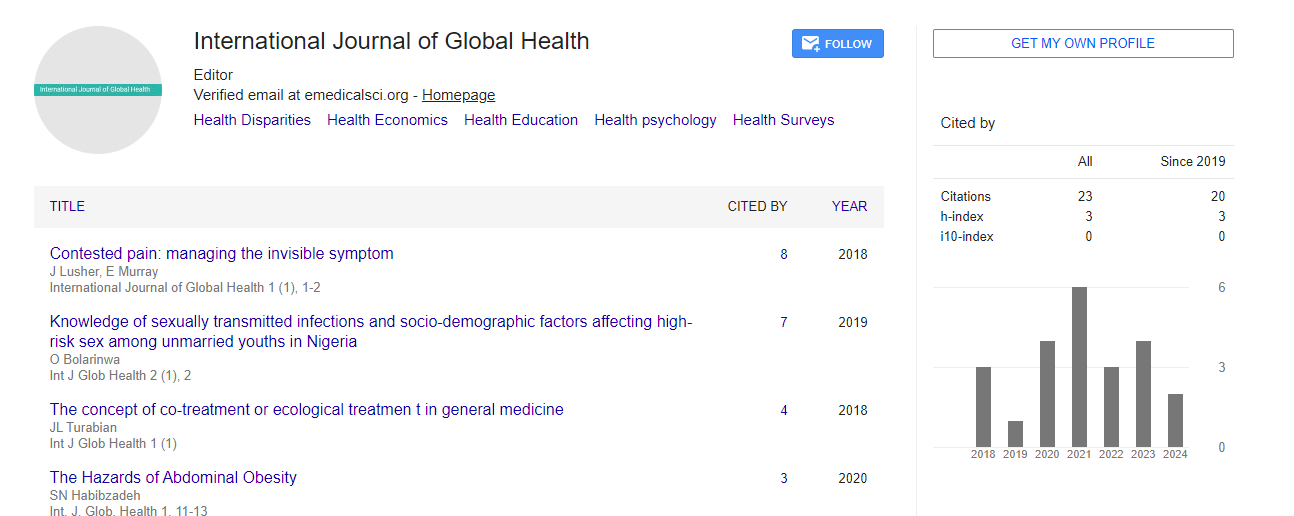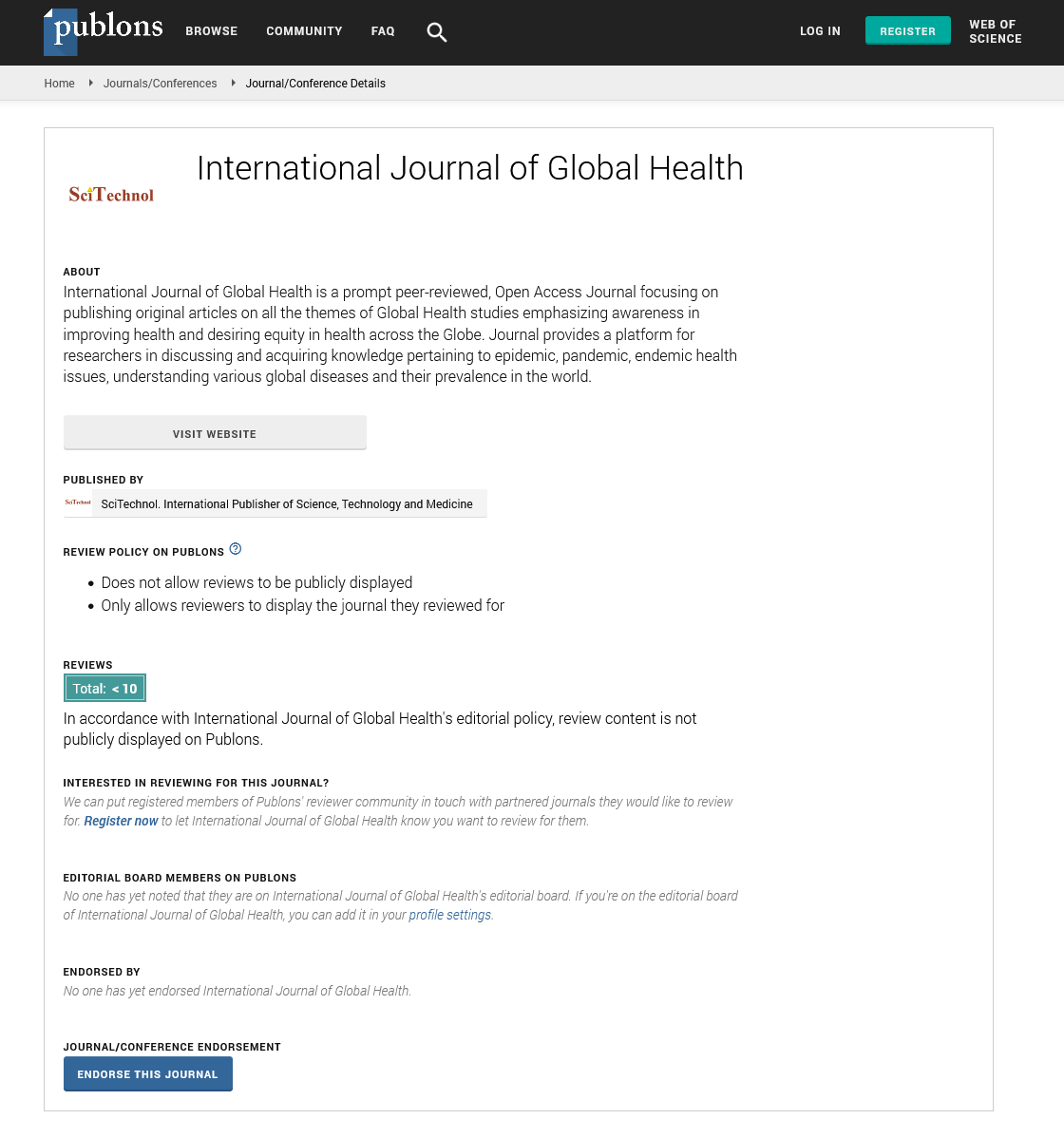Opinion Article, Int J Glob Health Vol: 6 Issue: 1
Global Health: The Key to Achieving a Healthier World
Edward Slama*
Department of Global Health, Imperial College London, London, United Kingdom
*Corresponding Author: Edward Slama
Department of Global Health, Imperial
College London, London, United Kingdom
Email: slamaedward@gmail.com
Received date: 21 February, 2023, Manuscript No. IJGH-23-93527;
Editor assigned date: 23 February, 2023, PreQC No. IJGH-23-93527 (PQ);
Reviewed date: 09 March, 2023, QC No. IJGH-23-93527;
Revised date: 16 March, 2023, Manuscript No. IJGH-23-93527 (R);
Published date: 23 March, 2023, DOI: 10.4172/Ijgh.1000169
Citation: Slama E (2023) Global Health: The Key to Achieving a Healthier World. Int J Glob Health 6:1.
Description
Global health refers to the study and practice of improving health and achieving equity in health for all people worldwide. It encompasses a wide range of issues, including infectious diseases, non-communicable diseases, environmental health, mental health, and health systems. In recent years, global health has become an increasingly important focus for policymakers, healthcare providers, and researchers worldwide, as they recognize the need to address the complex health challenges facing our interconnected world.
Importance of global health
Global health is critical for achieving a healthier world, as it addresses the health needs of populations across borders and promotes health equity. It recognizes that health is a human right and an essential component of sustainable development. Global health is particularly important for low- and middle-income countries, where many people lack access to basic healthcare services and face a high burden of disease.
Global health challenges
There are many challenges facing global health today. Infectious diseases like HIV/AIDS, malaria, and tuberculosis continue to cause significant morbidity and mortality, particularly in low- and middleincome countries. Non-communicable diseases like cancer, diabetes, and heart disease are also on the rise globally, as are mental health disorders. Additionally, environmental factors like air pollution, climate change, and access to clean water and sanitation are major contributors to poor health outcomes.
Role of global health in addressing challenges
Global health plays a critical role in addressing the health challenges facing our world today. It supports the development of healthcare systems, strengthens disease surveillance and response, and promotes health equity. Global health efforts have led to significant progress in reducing the burden of infectious diseases like HIV/AIDS and malaria, and have helped to improve maternal and child health outcomes. Additionally, global health initiatives have led to increased access to clean water and sanitation in many communities, which has helped to reduce the incidence of waterborne illnesses.
Global health partnerships
Global health partnerships are collaborations between different organizations, governments, and stakeholders to address specific global health challenges. These partnerships bring together expertise, resources, and funding to improve health outcomes in low- and middle-income countries. Some examples of global health partnerships include the Global Fund to Fight AIDS, Tuberculosis, and Malaria, the Gavi Alliance, and the Stop TB Partnership. These partnerships have been instrumental in supporting global health initiatives and have contributed to significant progress in reducing the burden of disease worldwide.
Role of technology in global health
Technology has the potential to transform global health by improving access to healthcare services, enhancing disease surveillance and response, and promoting health equity. Telemedicine, for example, allows healthcare providers to deliver care remotely, which can be particularly useful in low-resource settings. Mobile health technologies, such as text messaging and mobile apps, can help to improve health literacy and support disease prevention and management. Additionally, digital health technologies can be used to collect and analyze health data, which can help to inform public health policies and programs.
Importance of global health research
Global health research is essential for advancing our understanding of the complex health challenges facing our world today. It can help to identify new approaches to preventing and treating diseases, improve healthcare delivery, and promote health equity. Global health research is particularly important in low- and middle-income countries, where the burden of disease is high but research infrastructure is often limited. Investment in global health research is critical for addressing the health challenges facing our world today and ensuring that everyone has the opportunity to live a healthy life.
Global health is essential for achieving a healthier world, and addressing the complex health challenges facing our interconnected world requires a collaborative and interdisciplinary approach. Global health partnerships, technology, and research are all essential components of this approach, and continued investment in these areas is critical for ensuring that everyone has the opportunity to live a healthy life.
 Spanish
Spanish  Chinese
Chinese  Russian
Russian  German
German  French
French  Japanese
Japanese  Portuguese
Portuguese  Hindi
Hindi 
